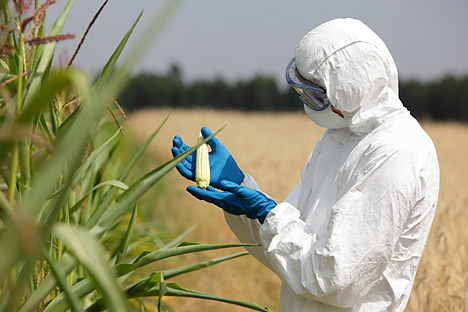
The new Russia decree may stimulate production of GM seeds in Russia. Source: Shutterstock
Russia has introduced a registration system for foods containing genetically modified organisms that could drag the illegal import of genetically modified seeds out of the shadows. Meanwhile, nongovernmental organizations are mounting a legal challenge to the government’s decision.
Prime Minister Dmitriy Medvedev signed the decree in September 2013 outlining the procedure for registration for GMOs, as well as giving the go-ahead for plan to carry out tests to examine the safety of GM varieties. The decree comes into affect June 1, 2014.
Officially, there is a ban currently in place on the import of GM varieties. In practice, however, GMOs are being used. “Without laboratory tests, it’s virtually impossible to work out whether seeds have been genetically modified,” says Mikhail Orlov, the president of Ambika-Agro. “So farmers buy whatever delivers the best result.”
According to Arkadiy Zlochevskiy, the president of the Russian Grain Union, 400,000 hectares (almost a million acres) of Russian land is being used to grow GM soya and maize alone.
Greenpeace, which is firmly opposed to GMOs, has discovered them in food produced by a large number of Russian companies. The environmentalists say food originating from 16 Russian producers contains GMOs. In addition, GMOs enter the Russian market via foreign products. Around the world, 130 million hectares have been planted with transgenic categories.
In Russia, many agricultural producers are ready and willing to switch to resistant categories. Oleg Bukin, chief agronomist at the Talin farming company in Mordovia, said he sees no reason to be afraid of new GM varieties.
“Introducing GM cultures will give farmers the chance to produce more but without spending more. GM cultures reduce the need for pesticides and increase our control over weeds, disease and pests,” he explained, adding that GM varieties do not always produce large yields, but their resistance to disease and pests helps more plants to survive, and provides a safeguard against unexpected losses.
Russia may ban import of products containing genetically modified organisms
Russian Agriculture Ministry holds conservative opinion on spread of GMOs
Experts believe the most promising GMOs are soya, maize and sugar beet.
Their seeds cost 50 percent more than regular seeds, but the net cost of the end product can be reduced by 20 percent. However, even though it has authorized the introduction of GMO cultures, Russia will still remain dependent on imports.
Syngenta, Monsanto, KWS and Pioneer could be among the companies exporting GMO seeds to Russia.
The new Russia decree may also stimulate production of GM seeds in Russia.
A large number of Russian research bodies, such as the Bioengineering Center, the Gene Biology Institute, the Institute of Agricultural Biotechnology and many others, are currently developing GM crop varieties.
But their work is mostly experimental in nature, because officially, growing these varieties has until now been banned. Seeds can now be grown, but specialists are not taking it upon themselves to forecast whether there will be demand for Russian varieties.
Many of the Russian nongovernmental organizations that oppose GM foods have already petitioned the Supreme Court in protest at the government decree. Their concerns go beyond considerations of health. They fear that, with the arrival of GM cereal crops, the domestic market will be taken over by various other types of foreign products designed to protect the plants.
Producers are obliged to shell out annually for seeds and pesticides from the very same foreign manufacturers,” said Anna Lyubovedskaya, the director of communications at the Union of Organic Farming. “These varieties have to be treated with specific compounds. With every passing year, parasites will become more accustomed to these pesticides, and so more and more of them will need to be bought.
However, it could prove difficult for these organizations to get what they want.
Russia is now a member of the World Trade Organization, and WTO rules may have a part to play. An attempt to block the import of GM varieties will be classified as an “unfair barrier to trade.”
For example, when Bolivia announced in August 2001 that its ban on GMOs was to be enshrined in a piece of permanent legislation, the United States and Argentina threatened to take it to arbitration at the WTO.
Soon after, Bolivia abandoned its plans. The same year, just six weeks after joining the WTO, China faced the threat of legal proceedings over its plans to make GMO labeling compulsory. It, too, dropped its plans. A year later, facing the threat of WTO trade sanctions, Canada also withdrew compulsory labeling.
Finally, in 2006, a WTO panel ruled that a European Union ban on the import of new GM varieties was unlawful.
The implementation of the government decree could be halted by a decree from the president. In August 2013, President Vladimir Putin instructed officials to increase monitoring of the trade in GM products.
This meant making registration more complicated. In other words, despite the fact that, from June 1, it will be possible to register GM seed corn, in practice, this process may drag out over several years.
“At the moment, the mechanism by which GM products will be checked in terms of biosecurity is unclear, so we shouldn’t expect to see them being sown any earlier than 2017 or 2018,” said Sergey Goncharov, the portfolio manager for cereal crops at Syngenta Ltd (Syngenta AG).
All rights reserved by Rossiyskaya Gazeta.
Subscribe
to our newsletter!
Get the week's best stories straight to your inbox